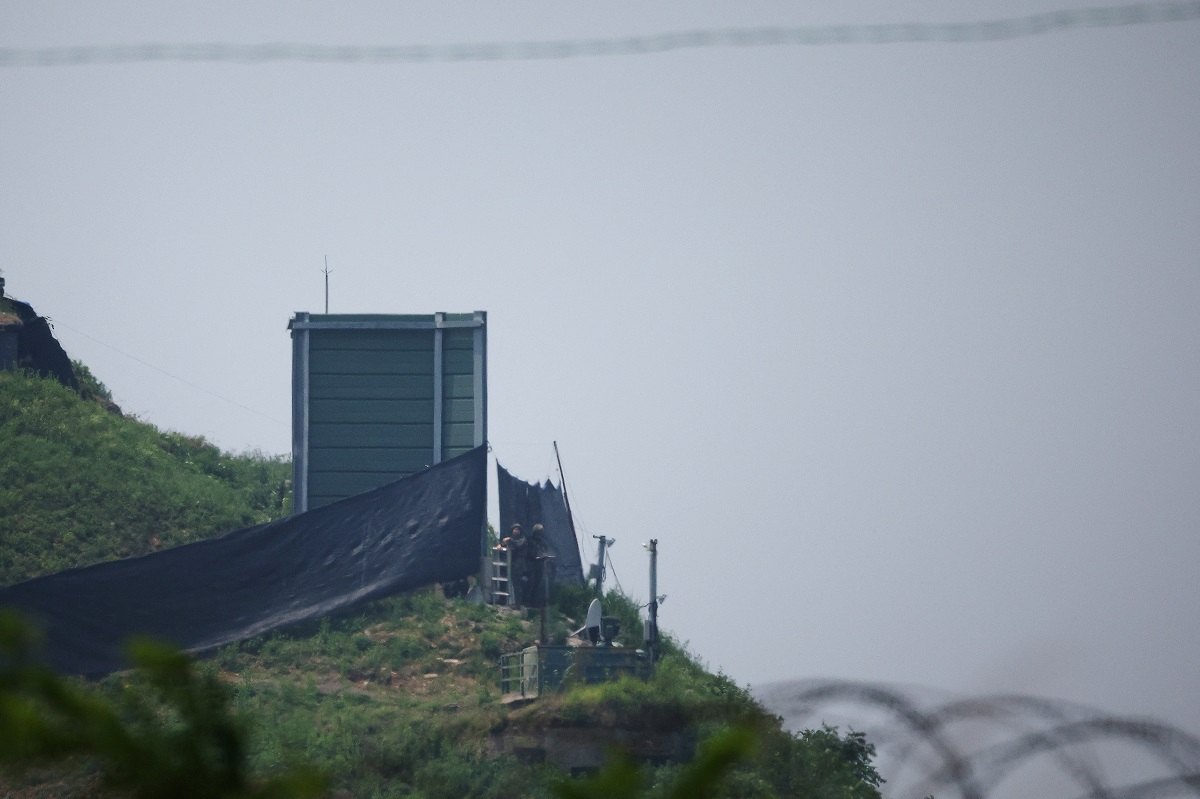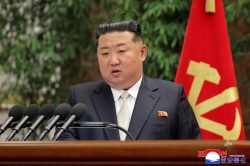
South Korean soldiers work next to a military facility (Green box) where loudspeakers dismantled in 2018 used to be, near the demilitarized zone separating the two Koreas in Paju, South Korea, June 10, 2024.
12:50 JST, June 17, 2024
SEOUL (Reuters) – The loudspeakers deployed by South Korea to wage psychological warfare against North Korea faced audits and legal battles claiming they are too quiet, raising questions over how far into the reclusive North their propaganda messages can blast.
South Korea resumed loudspeaker broadcasts directed at North Korea on June 9 for the first time since a now-defunct inter-Korean agreement banned them in 2018.
The current speakers were among 40 systems purchased in 2016 after the two Koreas exchanged artillery fire in a 2015 dispute over the broadcasts.
The military says the systems were designed to blare pop music and political messages as far as 10 kilometers (6.21 miles), enough to reach the city of Kaesong and its nearly 200,000 residents.
But audits released at the time, seen by Reuters, showed the new speakers did not meet those standards and were not as powerful as the military called for.
According to former navy officer Kim Young-su, although the speakers passed two out three initial tests in 2016, the trials took place in the morning or at night, when sound travels furthest.
South Korea rarely operates the speakers during those times now, so as not to disturb nearby South Korean residents as much, said Kim, who investigated and raised the issues to government corruption watchdogs and the police.
The issues led the Ministry of National Defence to sue the manufacturer, but a court dismissed the case, saying that too many environmental factors can affect the performance.
Tests in 2017 showed that messages or songs from the speakers could not be understood further than 7 kilometers, and more often closer to 5 kilometers, according to the audit and Kim, not enough to reach a city such as Kaesong.
The ministry told Reuters in a statement that performance may vary depending on conditions such as temperature, humidity, and terrain, but that it did not consider the loudspeakers’ performance to be restricted.
Kim Sung-min, who defected from the North in 1999 and runs a Seoul radio station that broadcasts news into North Korea, said the mountainous border terrain and North Korea’s own loudspeakers in the area further diminish the reach of South Korea’s psychological warfare.
North Korea’s broadcasts are less aimed at winning over people in the South and more at “suppressing” the South’s broadcasts by overpowering or muddling the message, he said.
Still, for North Koreans who hear the South Korean messages or catchy K-pop tunes that are banned in the North, the broadcasts can have a significant psychological impact, Kim Sung-min said.
“These broadcasts play a role in instilling a yearning for the outside world, or in making them realize that the textbooks they have been taught from are incorrect,” he said.
At least two North Korean soldiers from the frontlines defected to the South in 2017 after listening to loudspeaker broadcasts, local media reported, citing South Korean officials.
The angry North Korean reaction to the broadcasts also suggests the loudspeakers strike a nerve with the authoritarian country, said Steve Tharp, a retired U.S. Army officer who spent years working along the border.
“We know that the North Koreans find them partly effective because they have spent a lot of time getting them turned off,” he said.
Top Articles in News Services
-

Survey Shows False Election Info Perceived as True
-

Hong Kong Ex-Publisher Jimmy Lai’s Sentence Raises International Outcry as China Defends It
-

Japan’s Nikkei Stock Average Touches 58,000 as Yen, Jgbs Rally on Election Fallout (UPDATE 1)
-

Japan’s Nikkei Stock Average Falls as US-Iran Tensions Unsettle Investors (UPDATE 1)
-

Japan’s Nikkei Stock Average Rises on Tech Rally and Takaichi’s Spending Hopes (UPDATE 1)
JN ACCESS RANKING
-

Producer Behind Pop Group XG Arrested for Cocaine Possession
-

Japan PM Takaichi’s Cabinet Resigns en Masse
-

Man Infected with Measles Reportedly Dined at Restaurant in Tokyo Station
-

Israeli Ambassador to Japan Speaks about Japan’s Role in the Reconstruction of Gaza
-

Videos Plagiarized, Reposted with False Subtitles Claiming ‘Ryukyu Belongs to China’; Anti-China False Information Also Posted in Japan


























